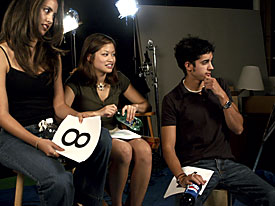 |
|
JOSHUA SILLS/Arizona Summer Wildcat
|
Maria Olea, a psychology junior, Joyce Wong, a theatre arts junior and Stefan Espinosa, a musical theatre junior evaluate an examples of disruptive behavior for a video which will be shown to incoming freshman during orientation.
|
|
By Tessa Hill
Arizona Daily Wildcat
Wednesday June 25, 2003
New video teaches incoming freshmen lessons in classroom etiquette
University officials are tired of ringing cell phones, constant chatting and skimpy clothes in the classroom. So this summer they are working to stop these "disruptive behaviors" before they start.
After surveying almost 800 students and faculty about what classroom behaviors really irk them, the Dean of Students office has compiled these "disruptive behaviors" in a video that is now being shown to incoming students during freshman orientation.
Styled after "American Idol," the seven-minute video depicts scenes of disruptive students whose actions are judged by a panel of three judges, one who resembles Simon Cowell.
According to survey results, 78 percent of instructors and nearly half of all students have experienced disruptive behavior in the classroom. Among the things that instructors said were most disturbing were: chattering, whispering and tardiness to class. Students placed ringing cell phones and chatting at the top of their list.
Regardless of the annoyance, Dean of Students Program Director Terry Holthusen said it is important for students to know what they can and cannot do in the classroom.
"Some students just don't understand boundaries, and we hope this can clarify and make clear what will and won't be tolerated," Holthusen said, adding that clarification is especially important because the university has a diverse population of people with different backgrounds and perceptions.
"A lot of students who do these things probably don't know how disruptive they actually are," said Celia Sepulveda, director of education and outreach for the Dean of Students office.
"We really tried to make the video student friendly and funny," Sepulveda said, adding that the $7,000 video, partially sponsored by the Pepsi-Cola Company, will hopefully make discussion about these behaviors and their consequences accessible to both new and continuing students.
The video shows several scenes, including one in which a female student dressed in revealing clothing shows off her new tattoo and one in which a student eats a full three-course meal in class. Other scenes show students arriving late to class and leaving early, as well as students who chat about the weekend in the middle of lecture.
The video was first showed to orientation students on June 17, and the majority of the student audience had one reaction: it was hilarious.
Many students said they had already experienced the "disruptive" and "annoying" behaviors depicted in the film while they were in high school.
"A lot of this is just common sense: be respectful of your peers and everyone will be much happier," said Joyanna Paski, an incoming freshman from Phoenix.
Paski said the humor and comic relief offered in the video was a nice change from typical orientation videos.
"I've seen a lot of really bad (videos) today; this is a nice break with a good message," Paski said.
Although he is not a big "American Idol" fan, James Maher, an incoming freshman from San Jose, California, said the video was an effective way to get the message across.
"It seemed a little goofy, but they tried to get the point across and it worked for the most part," Maher said, adding that he was disappointed because the video did not cover students with runny noses during tests.
"That, by far, is the worst because it seems to happen all the time," Maher said.
In the end, the Dean of Students office said it just wants students to be aware of their behavior and how it effects their peers so that the learning environment can be as positive and as pleasant as possible.
"It's a matter of realizing you are not the only one in the classroom," Holthusen said, but after that, "It's your prerogative."

